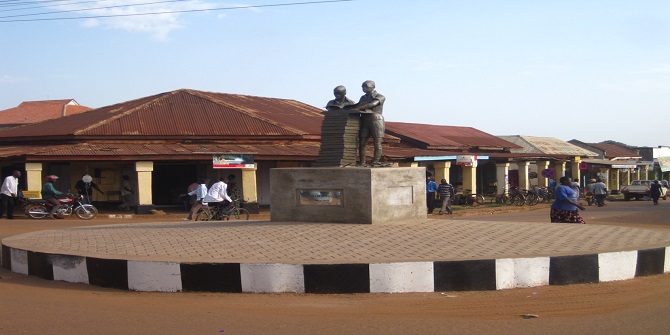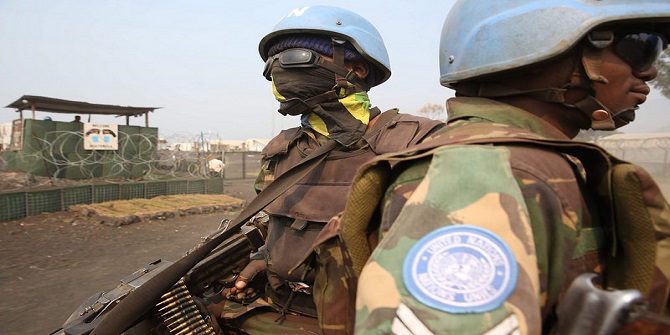Tom Kirk draws on the JSRP’s research to argue that calls to tackle the root causes of conflict and insecurity in many ‘fragile’ and ‘failing’ states require exploring new frameworks and acquiring historical understandings that can reveal how everyday security and justice is provided.
The JSRP has focused on places – including parts of the DRC, South Sudan, CAR and northern Uganda – where the state is weak or physically absent, and low levels of violence or conflict affect everyday life. It has sought to uncover how security and justice is often provided by local and international actors working beyond, in-between, and in collaboration with the state. And it has argued, therefore, that outsiders wishing to intervene or run developmental initiatives in such places must first understand how this happens.
This need has arguably become more important in light of the British government’s new direction for aid spending. This ‘new’ direction can be characterised by a reinvigorated effort to address the root causes of conflict and instability in what are termed ‘fragile’ states; whilst avoiding complicated military interventions. Indeed, in today’s political climate, pressure to show that aid can work in the national interest must be balanced with a reduced appetite for interventions or grand state-building projects.
The emerging alternative appears to be anchoring itself around calls for ‘politically smart, locally led’ development, which works at ‘arm’s length’ to support domestic actors to identify and solve their own problems. For some, this seems like common sense and what they have been trying to do all along; whilst for others, it demands nothing less than a sea change in how aid initiatives are funded, implemented and evaluated. Either-way, many are thinking about how this way of working can be applied to security and justice programmes.
One of the main findings of the JSRP has been that efforts to engage those providing security or justice in the contexts it works must begin from fine-grained, bottom-up research. Indeed, there is a pressing need to unsettle assumptions that the state is the primary and, in some cases, even the best actor to provide security and justice. At the same time, theory needs to move beyond characterisations of the ‘local’ – conceptualised as the non-state arrangements that spring up to provide such services – as somehow more legitimate in the eyes, or better attuned to the needs, of populations in conflict-affected regions.
The JSRP’s own struggle with popular concepts such as ‘hybridity’ is illustrative. Indeed, several years ago, a ‘hybrid political orders lens’ (as we came to call it) was seen to be increasingly favoured by development practitioners frustrated with the reductionism of the fragile states discourse and good governance doctrine. Rather than focusing on what is lacking in conflict-affected places, it allowed them to focus on the norms and practices underpinning informal or local security and justice arrangements, and to explore how they could be mixed with and permeate formal, state-based, or international arrangements. Yet, as the JSRP’s research progressed, we increasingly challenged this idea.
Perhaps most importantly, we worried that over-simplistic notions of the ‘local’ may be hindering realistic analyses of the power and politics of such arrangements, especially in the conflict-affected places we studied. Indeed, as shown by a selection of conference research papers, seemingly similar hybrid governance processes can have very different outcomes. Thus, it was argued that the challenge for analysts is to distinguish between arrangements that are locally legitimate and contributing to regulatory coherence and the establishment of a social contract (and perhaps the centralisation of authority); and those which are merely solidifying institutional pluralism and the fragmentation of authority (and perhaps the role of violence). Only then could analysts begin to theorise informal or hybrid security and justice arrangements.
This caution is in large part due to the reality that the provision of security and justice is often intimately bound up with different actors’ claims to public authority. By this, we mean that individuals, groups, states, and even international intervenors secure ordinary people or provide justice services as part of their bids to establish themselves as legitimate authorities. Moreover, these acts are inherently political as they often purposefully include some and exclude others.
Furthermore, whilst the JSRP’s studies contain rich material on how local armed non-state actors, shadowy networks, coalitions of business and civil society leaders, and neighbouring states are involved in the provision of security and justice, the range and variety of actors and processes they reveal complicates easy predications as to whether these dynamics will lead to peace and prosperity, or fragmentation and conflict. Indeed, the re-occurrence and persistence of violence and conflicts in many of our research sites testify to the difficulty of creating robust predictive theories.
To begin to deal with this complexity the JSRP’s researchers often adopted one of two overlapping strategies: the first has been to view research sites through Alex de Waal’s framework of the political marketplace. In brief, it suggests that in many of the programme’s field sites authorities that wish to hold onto power and secure a measure of stability must buy off rivals and incorporate them into rent-seeking elite coalitions. As part of such bargains, non-state armed groups and regional strongmen may be granted licenses to extract resources or taxes in remote, often border, provinces. In turn, they may provide a measure of short-term security and justice provision to placate local populations and legitimise their activities. The application of this transactional framework has helped the JSRP to explores the variety of actors and processes animating governance in the regions it studies, whilst shedding preconceived ideas as to the desirability of such arrangements.
For example, Tapscott’s research suggests that the presence of non-state security actors in Gulu, northern Uganda, should not be seen as a sign of state weakness. Rather, given the state’s limited resources and the region’s history of animosity towards central authorities, they represent a pragmatic and efficient mode of governance. Similarly, Schomerus and de Vries argue that the young South Sudanese state’s acknowledgement and support of local civilian defence groups should be seen as a conscious policy of ‘strategic engagement’. In these ways these states use proxies and patronage to be present in the lives of ordinary people without having to commit significant (probably unavailable) resources or take ultimate responsibility for their security. Through further research, one may even be led to conclude they have adopted contextually appropriate, ‘best fit’ approaches to security and justice provision.
The second strategy has been to view security and justice provision by different actors over a long period of time, thereby, allowing the likely effects of such dynamics on developmental prospects to further reveal themselves. For example, Pendle’s research explores how South Sudan’s titweng – groups of armed youth originally established to protect cattle – have been periodically instrumentalised by the state and warring elites. In the process local identities have been militarised and ethnic animosities used to pursue particular interests. Thus, although the case of the titweng illustrates how non-state armed actors can allow young and resource poor states to extend their authority to, and fulfil their security obligations at, the local level, it suggests that through such processes destabilising identities can be ‘woven over time into the culture and fabric of the government’. In this case, one may conclude that the short-term gains of such security arrangements are ultimately detrimental to long term stability.
In this sense, these two complementary strategies help the JSRP’s researchers to unpick the power and politics of the places they work. At the same time, they challenge our use of popular concepts such as ‘hybridity’ and help to avoid overly simplistic notions of the ‘local’. However, especially for me, arriving at such a point required some effort. On the one hand, we needed to put aside the desire to adopt the lenses or buzzwords of the day (especially those used by practitioners). Whilst, on the other, we had to acknowledge that arriving at neat predictive theory of security and justice provision, and developmental outcomes (at least in the programme’s field locations), is an ongoing project.
Nonetheless, the JSRP’s research clearly suggests that those seeking to reinvigorate interventions aimed at tackling persistent conflicts and instability would be well advised to destabilise mainstream ways of viewing and understanding non-state and state actors. Doing so will likely cause them to rethink the role they play in security and justice provision, and to investigate how the processes and practices they engage in may contribute to desired long-term outcomes.
Tom Kirk is the JSRP’s Online Editor and a PHD candidate at the London School of Economics and Political Science. Tom’s research interests include social accountability, and security and justice provision, with particular reference to Afghanistan, Timor-Leste and Pakistan. He also is interested in the application of technology for monitoring and evaluating development programmes.
Photo credit: MONUSCO via Foter.com / CC BY-SA
Note: This article gives the views of the author, and not the position of the Justice and Security Research Programme, nor of the London School of Economics.





